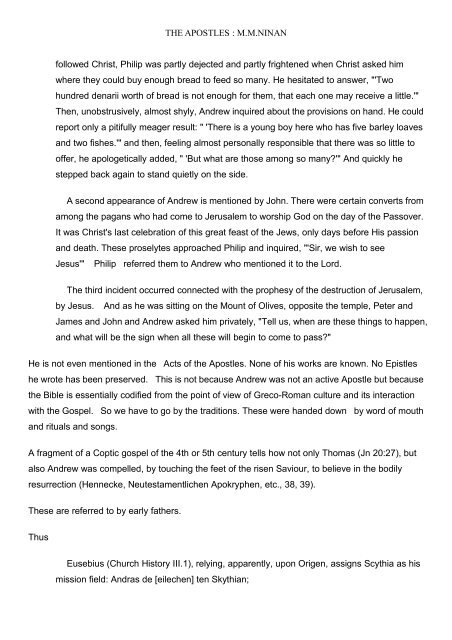Create successful ePaper yourself
Turn your PDF publications into a flip-book with our unique Google optimized e-Paper software.
THE APOSTLES : M.M.NINAN<br />
followed Christ, Philip was partly dejected and partly frightened when Christ asked him<br />
where they could buy enough bread to feed so many. He hesitated to answer, "'Two<br />
hundred denarii worth of bread is not enough for them, that each one may receive a little.'"<br />
Then, unobstrusively, almost shyly, Andrew inquired about the provisions on hand. He could<br />
report only a pitifully meager result: " 'There is a young boy here who has five barley loaves<br />
and two fishes.'" and then, feeling almost personally responsible that there was so little to<br />
offer, he apologetically added, " 'But what are those among so many?'" And quickly he<br />
stepped back again to stand quietly on the side.<br />
A second appearance of Andrew is mentioned by John. There were certain converts from<br />
among the pagans who had come to Jerusalem to worship God on the day of the Passover.<br />
It was Christ's last celebration of this great feast of the Jews, only days before His passion<br />
and death. These proselytes approached Philip and inquired, "'Sir, we wish to see<br />
Jesus'" Philip referred them to Andrew who mentioned it to the Lord.<br />
The third incident occurred connected with the prophesy of the destruction of Jerusalem,<br />
by Jesus. And as he was sitting on the Mount of Olives, opposite the temple, Peter and<br />
James and John and Andrew asked him privately, "Tell us, when are these things to happen,<br />
and what will be the sign when all these will begin to come to pass?"<br />
He is not even mentioned in the Acts of the <strong>Apostles</strong>. None of his works are known. No Epistles<br />
he wrote has been preserved. This is not because Andrew was not an active Apostle but because<br />
the Bible is essentially codified from the point of view of Greco-Roman culture and its interaction<br />
with the Gospel. So we have to go by the traditions. These were handed down by word of mouth<br />
and rituals and songs.<br />
A fragment of a Coptic gospel of the 4th or 5th century tells how not only Thomas (Jn 20:27), but<br />
also Andrew was compelled, by touching the feet of the risen Saviour, to believe in the bodily<br />
resurrection (Hennecke, Neutestamentlichen Apokryphen, etc., 38, 39).<br />
These are referred to by early fathers.<br />
Thus<br />
Eusebius (Church History III.1), relying, apparently, upon Origen, assigns Scythia as his<br />
mission field: Andras de [eilechen] ten Skythian;


















